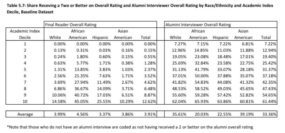Two recent news items caught my eye. First, crooked admissions advisor Rick Singer not only bribed coaches and faked sports credentials, he also encouraged clients’ kids, who are white, to apply as African-Americans or Hispanic-Americans (in one case, the kid ticked off both boxes!). Article here.
Second, the College Board has crafted an “Adversity Score” (article here). It is a black-box method way to capture whether kids are privileged or not.
Regarding the first item, I decided to hunt down a statistical study done of Harvard College admissions data. Over the weekend, I read the study. It is long but interesting.
An economics professor was hired to analyze the Harvard data. He did a bunch of statistical analyses, specifically, logistic regression models to measure the impact of each variable that goes into admissions decisions (race, legacy status, recruited athlete, “disadvantaged” economic background, test scores, teacher recommendations, alumni interview scores, GPAs, etc.). He then calculated each factor’s impact.
In other words, with all other variables identical, what is the impact if you only changed an applicant’s race? What if you only changed legacy status? And, so on and so forth.
There is no doubt Harvard clearly takes race into account (and, that’s not illegal). Specifically, Asian-Americans face a higher bar, and it is a huge boost if you apply as an African-American or Hispanic-American.
All this means that people like crooked Rick Singer and his shifty clients will game the system.
Some key findings from the study:
-
-
- Sports recruiting was the #1 boost by far. 86% of people on a coach’s list, for example, got in. A high percentage of such applicants are white.
- You also got an advantage if your family was viewed as a potential and major donor.
- “The average test scores for Asian-American applicants are higher than the average test scores of African-American and Hispanic admits” [author’s bold].
- Asian-Americans on average receive very high ratings from teachers, school counselors and alumni interviewers. Admissions officers also give them very high ratings for extracurricular activities and academic performance. Yet, the Asian-American acceptance rate is the lowest among all the groups.
- Harvard flags an application if it thinks that a student is from a modest economic background, which they call “disadvantaged”. Interestingly, the study found that race was a much bigger boost; advantaged URMs fared better in admissions than disadvantaged whites or Asian-Americans. In an odd twist, moreover, if you were both African-American and “disadvantaged,” it was a penalty in the admissions process (weird!).
- And last, here is an interesting table; I think it summarizes the lawsuit. It is a bit busy, but bear with me. Harvard rates each applicant with a score from 1 to 6, with 1 being best. If you get a 1 or 2, your chances of admissions are very good. So, this table looks at the percentage of people who get a 1 or a 2 rating based on their academic credentials (a 10 on the Academic Index Decile means you’re an academic superstar). If you look at the data, it is really hard to get a top rating from Admissions if you’re Asian-American, even if you crushed your interview (and, have great teacher recommendations, etc.).
-
People like Rick Singer know all this.
I’m really glad I am not in college admissions, as I wouldn’t know what to do. Not accounting for URMs would be very wrong, in my opinion. The data on redlining, oppression, and outright murder are clear. It is a long, sad and tragic set of crimes.
On sport recruiting, I’m on the fence, honestly. For most selective colleges, the programs do not generate any revenue, and almost no players there will go pro. When I was in college, students almost never attended games. In the rest of the world, including at places like Oxford and Cambridge, there is no “tip” for sports in admissions. But, I know that having committed athletes adds to diversity, and there’s a lot of benefit to that.
At the end of the day, college admissions offices are overwhelmed with applications, and sneaky people can game the system. Admissions cannot possibly fact-check everything on an application and do real due diligence.
That is why some test takers in China cheated on the SAT (source), a Louisiana school engaged in outright fraud to get its kids in (source), and a billionaire paid a $6.5 MM bribe to secure a spot at Stanford (source).
Anyone have ideas on how to fix the process? Is the Adversity Score a step in the right direction?

